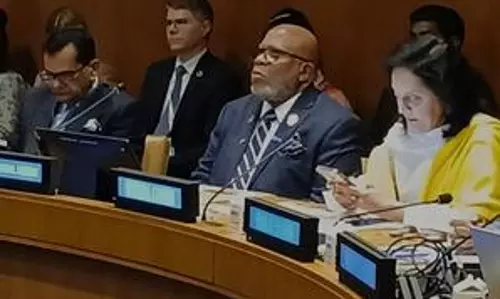
Modi's Trumpism
text_fields'Dermophis donaldtrumpi' – that was the name given by researchers to the amphibian (yet to be confirmed as a species) found near the Panama coast. The 'trumpi' that will sink its head while on land, is one of the species that will get extinct from earth at the face of global warming. The name was chosen for the being - discovered on the brink of extinction - as a protest against American President for his reactionary positions towards issues like global warming and climate change.
Donald Trump's attitude of sinking his head and taking positions against declared American stances on several issues has generally been termed 'Trumpism' - and the new naming follows that practice too. Going by this rationale, some legal reforms in our country, at least in so far as they concern cyber laws, will have to be called 'Modism'. An overall glance at the laws either amended in the name of 'national security', or propsoed to be amended so, will tell the extent to which 'Modism' has tightened its grip over the nation. Last month the Central Government issued an order authorising 10 government agencies to intercept computers and mobile phones. And this in a country where privacy has been declared a fundamental right. It was when the cyber world was debating this issue that news came of another legal 'reform' Modi government was getting ready for which is more insidious than this: that the government was proposing to amend Section 79 of IT Act with the intention of preventing spread of fake news and hate speech via social media. The draft of the bill for this purpose has been prepared by now, and postsed on IT Ministry's website to elicit comments and suggestions from the public.
It is clear that the intented legislation is a black law through which the government will be enabled to run an espionage network for both censorship and surveillance. If an individual posts some content against law or causing hatred, the party to face prosecution is that individual – not the intermediary carrier like Facebook; only in very rare cases have intermediaries (social media sites, applications that can conduct financial transactions or e-commerce sites like Amazon being examples) to face legal action. That extent of immunity is granted to the intermiary in Section 79 of IT Act, which does something more; it also protects the privacy of the user to a great extent. But with the proposed amendment, such a 'protection's is not necessary, and if authorities ask for the details of the user, they will have to be furnished within 72 hours – plus other similar changes. In other words, this law authorizes an unlimited invasion into privacy. Many have compared this amendment to the severe restrictions imposed by the Chinese government on internet users in China.
The government rationale put forward in favour of such an amendment is that it was prompted for the new legislation by incidents of fake news, unlawful posts and such content that led to trouble including communal riots. Even taking such an argument at its face value, the underlying danger is not small. The most crucial question in the issue is who defines fake news and unlawful social posts. Once the law comes into force, the authorities can ask intermediaries to remove even factual content terming it as 'fake'. For, the intermediaries have hardly the facility to probe into their veracity. The provision is that the intermediaries are required to remove such posts within 24 hours; and within hours thereafter have to furnish details of the author of that news or its editors. In short, through this, social media too is brought into the ambit of Modi government's undeclared media censorship.
As a result, this law becomes a prime tool of Modi government to gag social media which often becomes the voice of civic society. The draft floated now just mentions 'unlawful' social posts in a vague manner, but stops short of defining the term – which can just be another trap. It also contains provisions torpedoing the functioning of internet apps which run into lacs. With Lok Sabha elections at hand, the new idea has been seen as a brainwave of the Modi-Amit Shah-led clique to turn the political ambience in their favour.
Even otherwise, the practitioners of fake news and hate campaigns have most of the time been the sangh parivar. They were the people who introduced that very culture in our land. It is by now a proven fact that Modi himself follows on Twitter over thousand people who work as fake news factories. Despite being reminded of that he not only did not correct himself, but went on encouraging their posts too. And he reaped a no small political profit for himself and sangh parivar. Given these facts, if they insist on moving forward with such 'reform', that cannot be viewed without suspicion.
For these very reasons, the draft bill in its published form cannot be allowed to be introduced in parliament. On earlier occasions, it was possible to correct the government to a great extent on the issue of 'new neutrality' through the intervention of civic society. The country now once again is calling for such an intervention from the cyber world.






















